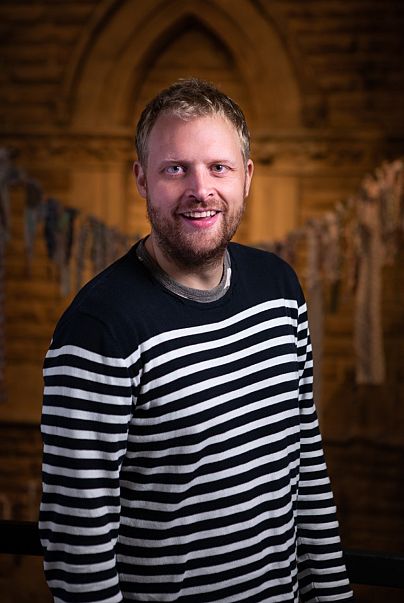The UK's Brexit transition period for leaving the EU has ended and with it the country's membership of the decades-old Erasmus programme. Here's what alumni of the scheme have to say about the UK leaving it.
 ADVERTISEMENT
ADVERTISEMENT
As the clock struck midnight in Brussels on December 31, the UK's Brexit transition period for leaving the EU ended and with it the country's membership of the decades-old Erasmus programme.
As many as three million people have passed through the scheme since it started in 1987, which offers university students in the European Union the opportunity to study in another country.
The programme also has some famous alumni, including former EU High Representative Federica Mogherini, a host of European politicians and Tom Bird, former executive producer at Shakespeare’s Globe Theatre in London.
Now the executive director at York Theatre Royal, Bird told Euronews the career milestones he has accomplished "are inspired by the spirit of adventure Erasmus gave me".
He attributes this to the challenge of turning up in a new city that he'd never been to before with no friends and "trying to succeed".
"Taking the UK out of the Erasmus scheme feels like an act of educational vandalism and it also feels like an act of cultural vandalism," he said.
Bird says that without the scheme he wouldn't have been able to finance his year of study in Copenhagen, Denmark, in 2004 while he was taking a degree at Edinburgh University, as it provided him with a grant to live on that was a "massive help".
"There are thousands of people like me for whom this really opened up the world and my career became more internationalist," he added.
The UK government has said the replacement Turing scheme, named after the celebrated English mathematician and WWII code breaker, will offer wider access to students who will be able to study at universities across the world, not just in Europe, although the finer details have yet to be published.
Bird says there are possible benefits to a new programme, like the fact that it might be more global.
He hopes the new scheme will be well advertised and its benefits communicated to students, which he feels the UK government and the EU failed to do with the Erasmus programme.
'It helped to move me away from thinking in a narrow-minded, insular way about the world'
But John Cotter doesn't see the new programme as enough to warrant pulling out of Erasmus: "From what I have read, the proposed Turing scheme will not be an adequate replacement of Erasmus," he told Euronews.
Now a law lecturer at Keele University, he studied in Konstanz, Germany in 2002/03 while reading Law and German in Cork, Ireland.
UK Cabinet Minister Michael Gove has said the country's decision not to opt into Erasmus after Brexit comes down to the taxpayer's bang for their buck, adding the new scheme would be catered towards students from less privileged backgrounds "who were often those who didn’t benefit from schemes like Erasmus.”
“The hundreds of millions of pounds additionally it would have cost us are better spent on making sure that disadvantaged children ... get a better education," he added.
But Cotter refutes this saying he did not come from a well-off home situation and the scheme "has transformed the lives of many people from all sorts of backgrounds, mine included."
On a professional level, he said his time in Germany opened his eyes to the differences in things like infrastructure between countries and, professionally, it "really began my interest in EU law, which is what I ended up specialising in".
"Learning German law made me see EU law and Irish law in a new light," he added.
It turned out to be 'one of the most far-reaching decisions of my life'
The Erasmus scheme has also helped Europeans come to the UK to study, with some building a life or a career there.
After leaving school in Germany at 16 to do an apprenticeship as a technician, Manfred Suddendorf returned to higher education in his 20s at Aachen University and went to the University of Coventry for a year on the Erasmus scheme.
"In this year, I fell in love with Britain and its people. My English improved considerably and I felt it was too early to leave."
Suddendorf stayed in the UK and completed a PhD, something he says he would never have done without his experience at Coventry, and worked for several years in his chosen field of Biomedical Engineering.
Some critics have pointed out the high cost of the scheme - in its current incarnation, the Erasmus+ programme saw Britain contribute around €1.8 billion from 2014-2020 and get back around €1 billion, according to the Department for Education.
A cost that Gove said "was too great" to warrant the terms the UK was offered in the Brexit deal.
The DfE has said more than £100m (€112 million) will go on the Turing scheme to provide funding for around 35,000 students to go on placements, targetted at students from disadvantaged backgrounds.
"I think it is wrong to think of Erasmus as a taxpayer-funded jolly, although, I'm not saying this does not happen," said Suddendorf.
"For me, it was a lot of very hard work, but more importantly a fantastic opportunity that transformed my life."
While the issues of cost and accessibility have tolled the death knell for the Erasmus programme in the UK, it has undoubtedly changed the lives of many British and European students alike.
A new generation of young people will now be awaiting further details from the UK government about what the Turing scheme can offer them.












